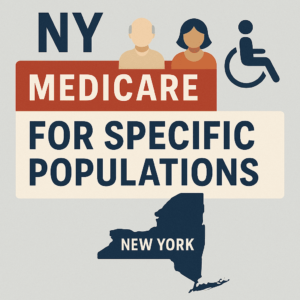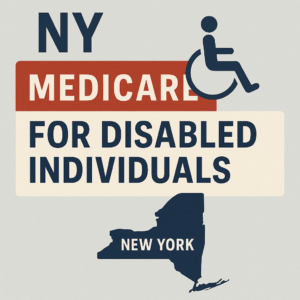Medicare for Specific Populations in NY
Medicare is a vital healthcare program for millions of Americans, but its benefits and eligibility criteria can vary significantly depending on your specific circumstances. For New Yorkers, understanding how Medicare works for different populations—such as seniors, veterans, disabled individuals, and low-income beneficiaries—is crucial to making informed decisions about healthcare coverage. This pillar article dives deep into Medicare for specific populations in NY, providing actionable insights, eligibility details, and tips to help you navigate the system effectively.
Introduction: Medicare for Specific Populations in NY
Medicare is a federal health insurance program primarily designed for individuals aged 65 and older. However, it also serves other specific populations, including veterans, disabled individuals, and low-income beneficiaries. In New York, where healthcare needs are diverse and often complex, understanding how Medicare caters to these groups is essential.
This article explores:
- How Medicare serves seniors, veterans, disabled individuals, and low-income beneficiaries in NY.
- Key differences in eligibility and benefits for these groups.
- Tips for choosing the right plan based on your unique needs.
Whether you’re a retiree, a veteran, or someone living with a disability, this guide will help you make the most of Medicare in New York.

Medicare NY for Seniors: Understanding Coverage
Who Qualifies for Medicare NY Seniors Coverage?
Medicare is primarily available to individuals aged 65 and older. To qualify, you or your spouse must have worked and paid Medicare taxes for at least 10 years.
Benefits of Original Medicare vs. Medicare Advantage for Seniors
- Original Medicare: Includes Part A (hospital insurance) and Part B (medical insurance). It offers flexibility in choosing healthcare providers but may require supplemental coverage for prescription drugs and other services.
- Medicare Advantage (Part C): Combines Parts A and B, often including Part D (prescription drug coverage) and additional benefits like dental and vision care.
How to Choose the Right Medicare Plan for Aging Adults in NY
- Assess your healthcare needs, including prescription drugs and preferred doctors.
- Compare costs, including premiums, deductibles, and out-of-pocket maximums.
- Consider supplemental plans like Medigap to cover gaps in Original Medicare.
NY Medicare for Retirees: What You Need to Know
Medicare Options for Retired Individuals in New York
Retirees can choose between Original Medicare and Medicare Advantage plans. Many retirees also opt for supplemental coverage to reduce out-of-pocket costs.
The Role of Employer-Sponsored Retiree Medicare Plans
Some employers offer retiree health plans that work alongside Medicare. These plans can help cover costs not included in Original Medicare, such as deductibles and copayments.
How to Supplement Medicare Coverage for Retirees
- Enroll in a Medigap plan to cover gaps in Original Medicare.
- Consider a Medicare Advantage plan with additional benefits.
- Explore Part D plans for prescription drug coverage.

Medicare NY for Veterans: How It Works
How Medicare Works for Veterans in NY
Veterans can use Medicare alongside VA benefits. While VA benefits cover services at VA facilities, Medicare provides access to a broader network of healthcare providers.
Coordination Between Veteran Medicare Plans NY and VA Benefits
- VA benefits do not require Medicare, but having both can provide more comprehensive coverage.
- Medicare Advantage plans may offer additional benefits tailored to veterans.
Choosing Between VA, TRICARE, and Medicare Advantage Options
- VA Benefits: Ideal for those who primarily use VA facilities.
- TRICARE: Available to military retirees and their families.
- Medicare Advantage: Offers flexibility and additional benefits.
NY Medicare Disability Coverage: Who Qualifies?
NY Medicare Disability Eligibility and Enrollment Requirements
Individuals under 65 with certain disabilities or conditions (e.g., ALS or ESRD) may qualify for Medicare. You must receive Social Security Disability Insurance (SSDI) for at least 24 months to be eligible.
Medicare for Individuals Under 65 with Disabilities
Medicare provides essential coverage for disabled individuals, including hospital stays, doctor visits, and prescription drugs.
Differences in Medicare Coverage for Disabled Individuals vs. Seniors
- Disabled individuals may qualify for Medicare before age 65.
- Special Needs Plans (SNPs) are available for those with specific chronic conditions.
NY Medicare for Disabled Individuals: Coverage Options
How Medicare Provides Coverage for Disabled Beneficiaries
Medicare offers the same benefits to disabled individuals as it does to seniors, including Parts A, B, and D.
Supplemental Coverage Options for Disabled Individuals
- Medigap plans can help cover out-of-pocket costs.
- Medicaid may provide additional assistance for low-income disabled individuals.
Medicare Advantage and Special Needs Plans (SNPs) for the Disabled
SNPs are designed for individuals with specific conditions, such as diabetes or heart disease, and offer tailored benefits.

Medicare NY Low-Income Assistance Programs
Medicare Savings Programs (MSPs) for Low-Income Beneficiaries
MSPs help pay for Medicare premiums, deductibles, and copayments for eligible low-income individuals.
Extra Help Program for Prescription Drug Costs
This program reduces the cost of Medicare Part D prescription drugs for those with limited income and resources.
Medicaid and Medicare Dual Eligibility in NY
Dual-eligible individuals can receive both Medicaid and Medicare, ensuring comprehensive coverage with minimal out-of-pocket costs.
8. Comparing Plans for Different Medicare NY Populations
| Population | Best Medicare Options | Key Considerations |
| Seniors | Original Medicare + Medigap or Medicare Advantage | Prescription drug coverage, doctor networks |
| Veterans | Medicare + VA benefits or Medicare Advantage | Coordination with VA benefits |
| Disabled Individuals | Medicare Advantage SNPs or Original Medicare | Chronic condition management |
| Low-Income | Medicare + Medicaid or MSPs | Cost-saving programs |
9. How to Apply for Medicare in NY for Different Populations
Steps to Enroll
- Determine your eligibility based on age, disability status, or income.
- Gather necessary documents, such as proof of age, residency, and income.
- Apply online, by phone, or in person at a Social Security office.
Documentation Needed
- Social Security number
- Proof of age and residency
- Income and asset information
Where to Get Assistance
- Local Social Security offices
- New York State Health Insurance Assistance Program (SHIP)
- Medicare.gov
Conclusion
Medicare is a lifeline for many New Yorkers, but navigating its complexities can be challenging. By understanding the specific options available for seniors, veterans, disabled individuals, and low-income beneficiaries, you can make informed decisions that best suit your healthcare needs. Whether you’re enrolling for the first time or exploring supplemental coverage, this guide provides the tools and insights to help you maximize your Medicare benefits in NY.
FAQ
Can veterans in NY use both Medicare and VA benefits?
Yes, veterans can use both Medicare and VA benefits. Medicare provides access to a broader network of providers, while VA benefits cover services at VA facilities.
What is the difference between Original Medicare and Medicare Advantage?
Original Medicare includes Parts A and B, while Medicare Advantage (Part C) combines Parts A, B, and often Part D, with additional benefits like dental and vision care.
How do I qualify for Medicare if I’m under 65 and disabled?
You must receive Social Security Disability Insurance (SSDI) for at least 24 months or have certain conditions like ALS or ESRD to qualify for Medicare under 65.
Are there programs to help low-income individuals pay for Medicare in NY?
Yes, Medicare Savings Programs (MSPs) and the Extra Help program can assist with premiums, deductibles, and prescription drug costs.
What are Special Needs Plans (SNPs)?
SNPs are Medicare Advantage plans designed for individuals with specific chronic conditions or disabilities, offering benefits and care management.